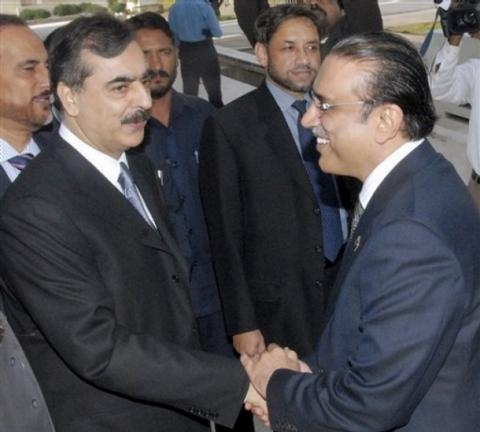Pakistan, a survivor

What keeps Pakistan afloat? How—despite its seemingly precarious political existence and the gloom and doom spread by the highly politicised media, as well as the horrendous bomb blasts—does the country manage to survive?
The immense reserves of resilience the people have are striking. In the forefront are those who lead them. These leaders are not the ministers and elected representatives, who unfortunately lack the mettle that goes into the making of leadership. Our real leaders are the thousands of community activists in our midst—many of whom are not necessarily well-known.
(Picture: Pakistani President Asif Ali Zardari and Prime Minister Yousaf Raza Gilani, who head the government which Mustafa contends are not really leading Pakistan)
There are so many of them that it almost appears to be a national conspiracy hatched by the media to keep such activists out of the limelight. Have you heard of Tahira Ali, who works for the rights of Karachi’s fisher folk? Or Majeed Manghrio of Sanghar, one of the largest districts in the Sindh province, who became his community’s leader in its struggle against the landlords in their dispute over Chottiari Dam? Or Amir Mohammad from the North West Frontier Province who is leading a movement to save the forests of the Frontier? And what about the theatre group from Lyari, a small area of Karachi, which stages street plays to promote harmony in its strife-torn locality.
The endeavours of these activists and many others should be celebrated.
They are idealists—some more, some less. But they all have a “utopian desire to serve others, to solve real problems, to create a better world, more kind, more just and more prosperous,” to quote the late Dr. Akhtar Hameed Khan. An activist par excellence, who preferred to call himself a social scientist, Khan had a dream and the qualities all successful leaders possess: idealism, courage to effect change, selflessness and a love for humanity.
It is a befitting tribute to Khan that his legacy, the Orangi Pilot Project (OPP) - an innovative programme that helped squatters in the Orangi district of Karachi solve their own sanitation and housing problems—should hold a forum every year in December to mark the anniversary of his death.
The reason for holding this intellectual exercise is to honour the memory of this great man and carry on his message by encouraging the networking of activists from all over Pakistan. It was at the 10th such forum where I met the aforementioned activists and learnt of their good work.
Unlike advocacy, activism actually brings about changes in social and physical conditions without waiting for the government or state institutions to act.
This activism at the grassroots helps Pakistan survive.
For Khan, a modest and unassuming man, there could be no bigger sin than an "I know best" attitude especially vis-à-vis the community with which he worked. His philosophy of research and extension involved studying the problems of a community and learning from its members about how they coped. On the basis of that knowledge he sought to develop a package of technical guidelines that he offered to people as a measure of support. His basic findings and observations were most interesting.
First, when the government fails, local communities rise to the occasion and work on a self-help basis. Second, people will mobilise their own financial resources and manpower if they are provided social and technical guidance. Third, the main concerns of the people are housing and sanitation, healthcare, education and employment.
A close look at the Orangi experiment and Khan’s own work confirms that successful activism is a dual-tiered operation. It involves mainstream community leaders who understand the thinking, needs and aspirations of their people.
The second tier comprises equally committed individuals, mainly professionals, who may not be drawn from the community but have strong empathy with it. Their role is what Khan described his own to be—that of a dadi amma, or grandmother, who holds the family together while providing each member solace and guidance. This second tier is vital to providing confidence and continuous support for social mobilisation.
These professionals, not drawn from the community, are needed until the community reaches that level of education and training where it can produce its own professionals. The second tier must, however, have strong links and identify with the population to enjoy the confidence of indigenous activists.
All development projects, whether for housing, education or primary healthcare, must have these two closely integrated tiers of activism if they are to succeed. Without the participation of the people at the grassroots, no development strategy can work and the local leadership alone has to mobilise people.
It is these secrets that have made the OPP feasible and replicable. The proof lies in the expanding network of non-governmental organisations and community-based organisations that has links with the OPP and which keeps growing, vindicating Khan’s philosophy.
*Zubeida Mustafa is a journalist from Pakistan. He has twice awarded the Population Institute’s Global Media Award for Excellence.
With thanks to CG News.
